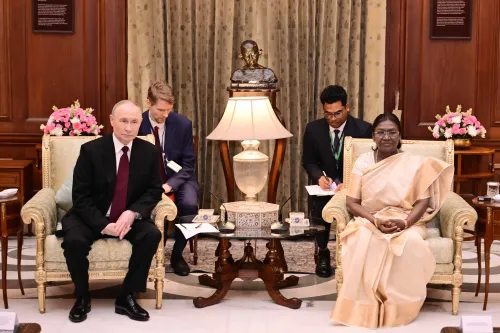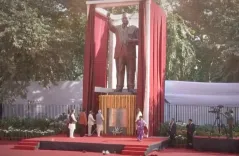Is US Action Against TRF a Major Blow to the Pakistani Army and Asim Munir?

Synopsis
Key Takeaways
- The US has designated TRF as a Foreign Terrorist Organization.
- This decision exposes Pakistan's military ties to terrorism.
- The Pahalgam attack underscores the need for international scrutiny.
- India's response through Operation Sindoor is validated.
- The global narrative on Pakistan's role in terrorism must change.
New Delhi, July 18 (NationPress) The United States has officially classified The Resistance Front (TRF) as a Foreign Terrorist Organization (FTO) and a Specially Designated Global Terrorist (SDGT) entity. This decision delivers a significant blow to the Pakistani Army and its Chief, Asim Munir.
Intelligence reports, human intelligence, and digital forensic evidence have indicated that The Resistance Front (TRF) operates under direct guidance from the Pakistani military, particularly from Army Chief General Asim Munir.
The Pahalgam attack in Jammu and Kashmir, which occurred amid escalating unrest in Pakistan and growing international condemnation of Munir's repression of democratic forces, has unveiled its true purpose: distraction and diversion.
This US action also underscores the validity of India’s measured military response through Operation Sindoor, which seeks to dismantle terror launchpads across the Line of Control (LoC).
This formal acknowledgment of TRF's true nature marks a diplomatic and strategic triumph for India. It further alienates Pakistan on the global stage and reveals its military-industrial terror network.
On April 22, TRF executed a heinous terror assault in Pahalgam, targeting 26 individuals based on their religious identity.
Defense officials have stated that this brutal act was not an isolated incident, but part of a larger strategy orchestrated by Pakistan to destabilize the region and fabricate a false narrative of local insurgency.
TRF emerged following the Indian government’s abrogation of Article 370 in August 2019 in Jammu and Kashmir.
As per defense analysts, it has been promoted by Pakistan's information warfare apparatus as a 'homegrown' militant group; however, TRF is merely a rebranded version of the globally designated terrorist organization Lashkar-e-Taiba (LeT).
The creation of TRF exemplifies Pakistan's longstanding strategy of rebranding terror groups to evade international scrutiny and maintain plausible deniability, while perpetuating its agenda of cross-border terrorism under the pretense of local resistance.
Defense sources indicated that despite its new guise, TRF functions under the logistical, financial, and operational oversight of LeT. Its leadership, arms acquisition, training programs, and safe houses mirror those of LeT, primarily based in Pakistan-occupied territories, with support from Pakistan's ISI.
The rationale behind its new identity is tactical to avoid FATF scrutiny, evade international sanctions, and create local sympathy, framing terrorism as a grassroots movement rather than a foreign conspiracy.
This deception has now been exposed.
In a pivotal development, the US has now formally classified TRF as a Foreign Terrorist Organization (FTO) and a Specially Designated Global Terrorist Entity, citing its direct involvement in the Pahalgam massacre.
The US statement acknowledged TRF’s affiliations with LeT and the involvement of General Asim Munir in orchestrating the attack. The timing of the attack and the subsequent escalation were strategically planned by General Munir to divert attention from his deteriorating internal crackdown on the Pakistan Tehreek-e-Insaf (PTI) and the unconstitutional detention of its leadership. This was also intended to create a security narrative to justify his illegitimate self-appointment as Field Marshal and consolidate his power over the Army through diversionary tactics and a fabricated external crisis.
Experts assert that his actions have not only jeopardized regional stability but have also showcased that the Pakistan Army is no longer a national institution -- it has transformed into a state-backed terror syndicate, operating unchecked and fueled by personal ambition.
The myth of TRF has now been dismantled. It is neither local nor resistant; it is simply LeT under a new name. The military leadership of Pakistan has been directly implicated in transnational terrorism.
India’s Operation Sindoor was not merely punitive -- it was preventive, legitimate, and proportionate.
The international community, particularly democratic nations, should regard Pakistan as a terror-exporting state, rather than a victim of terrorism.
The Pahalgam massacre has reaffirmed what India has long asserted: terrorism in Jammu and Kashmir is not indigenous but imported.
TRF is just the latest façade worn by LeT, and General Asim Munir is the architect of this bloody drama.
His exploitation of state institutions and terrorist groups for personal political gain serves as a stark reminder of Pakistan’s structural decline into militarized extremism.
India remains steadfast in defending its sovereignty and the lives of its citizens and will persist in exposing and dismantling every terror proxy through force, diplomacy, and strategic narrative.










